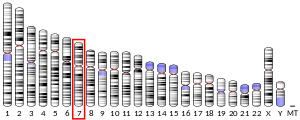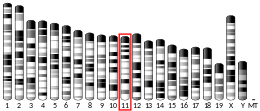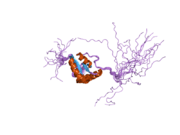DNA polymerase mu
DNA polymerase mu is a polymerase enzyme found in eukaryotes. In humans, this protein is encoded by the POLM gene.[5]
Function
Pol μ is a member of the X family of DNA polymerases. It participates in resynthesis of damaged or missing nucleotides during the non-homologous end joining (NHEJ) pathway of DNA repair.[6] Pol μ interacts with Ku and DNA ligase IV, which also participate in NHEJ.[7] It is structurally and functionally related to pol λ, and, like pol λ, pol μ has a BRCT domain that is thought to mediate interactions with other DNA repair proteins.[8] Unlike pol λ, however, pol μ has the unique ability to add a base to a blunt end that is templated by the overhang on the opposite end of the double-strand break.[9] Pol μ is also closely related to terminal deoxynucleotidyl transferase (TdT), a specialized DNA polymerase that adds random nucleotides to DNA ends during V(D)J recombination, the process by which B-cell and T-cell receptor diversity is generated in the vertebrate immune system. Like TdT, pol μ participates in V(D)J recombination, but only during light chain rearrangements.[10] This is distinct from pol λ, which is involved in heavy chain rearrangements.[11]
POLM mutant mice
In polymerase mu mutant mice, hematopoietic cell development is defective in several peripheral and bone marrow cell populations with about a 40% decrease in bone marrow cell number that includes several hematopoietic lineages.[12] Expansion potential of hematopoietic progenitor cells is also reduced. These characteristics correlate with reduced ability to repair double-strand breaks in hematopoietic tissue. Whole body gamma irradiation of polymerase mu mutant mice indicates that polymerase mu also has a role in double-strand break repair in other tissues unrelated to hematopoietic tissue. Thus polymerase mu has a significant role in maintaining genetic stability in hematopoietic and non-hematopoietic tissue.
References
- GRCh38: Ensembl release 89: ENSG00000122678 - Ensembl, May 2017
- GRCm38: Ensembl release 89: ENSMUSG00000020474 - Ensembl, May 2017
- "Human PubMed Reference:". National Center for Biotechnology Information, U.S. National Library of Medicine.
- "Mouse PubMed Reference:". National Center for Biotechnology Information, U.S. National Library of Medicine.
- "Entrez Gene: POLM polymerase (DNA directed), mu".
- Daley JM, Laan RL, Suresh A, Wilson TE (August 2005). "DNA joint dependence of pol X family polymerase action in nonhomologous end joining". J. Biol. Chem. 280 (32): 29030–7. doi:10.1074/jbc.M505277200. PMID 15964833.
- Mahajan KN, Nick McElhinny SA, Mitchell BS, Ramsden DA (July 2002). "Association of DNA polymerase mu (pol mu) with Ku and ligase IV: role for pol mu in end-joining double-strand break repair". Mol. Cell. Biol. 22 (14): 5194–202. doi:10.1128/MCB.22.14.5194-5202.2002. PMC 139779. PMID 12077346.
- Nick McElhinny SA, Ramsden DA (August 2004). "Sibling rivalry: competition between Pol X family members in V(D)J recombination and general double strand break repair". Immunol. Rev. 200: 156–64. doi:10.1111/j.0105-2896.2004.00160.x. PMID 15242403.
- Nick McElhinny SA, Havener JM, Garcia-Diaz M, et al. (August 2005). "A gradient of template dependence defines distinct biological roles for family X polymerases in nonhomologous end joining". Mol. Cell. 19 (3): 357–66. doi:10.1016/j.molcel.2005.06.012. PMID 16061182.
- Bertocci B, De Smet A, Berek C, Weill JC, Reynaud CA (August 2003). "Immunoglobulin kappa light chain gene rearrangement is impaired in mice deficient for DNA polymerase mu". Immunity. 19 (2): 203–11. doi:10.1016/S1074-7613(03)00203-6. PMID 12932354.
- Bertocci B, De Smet A, Weill JC, Reynaud CA (July 2006). "Nonoverlapping functions of DNA polymerases mu, lambda, and terminal deoxynucleotidyltransferase during immunoglobulin V(D)J recombination in vivo" (PDF). Immunity. 25 (1): 31–41. doi:10.1016/j.immuni.2006.04.013. PMID 16860755.
- Lucas D, Escudero B, Ligos JM, Segovia JC, Estrada JC, Terrados G, Blanco L, Samper E, Bernad A (Feb 2009). "Altered hematopoiesis in mice lacking DNA polymerase mu is due to inefficient double-strand break repair". PLoS Genet. 5 (2): e1000389. doi:10.1371/journal.pgen.1000389. PMC 2638008. PMID 19229323.
External links
- Overview of all the structural information available in the PDB for UniProt: Q9NP87 (Human DNA-directed DNA/RNA polymerase mu) at the PDBe-KB.







